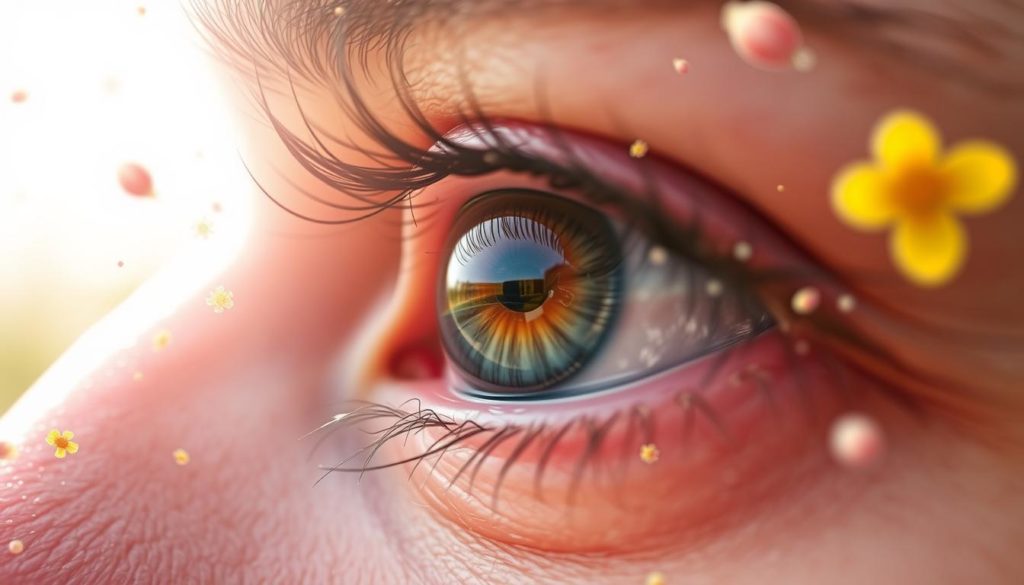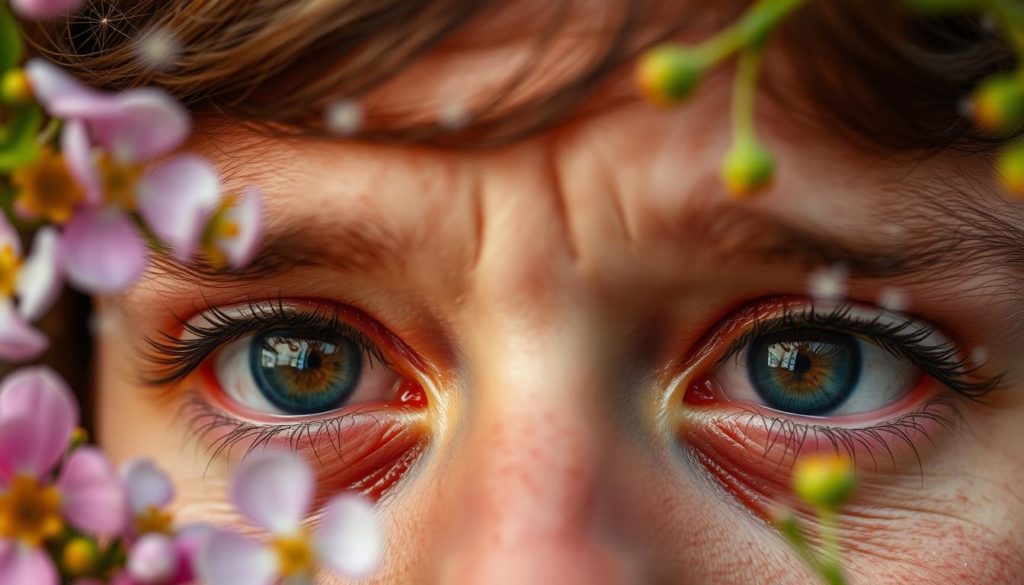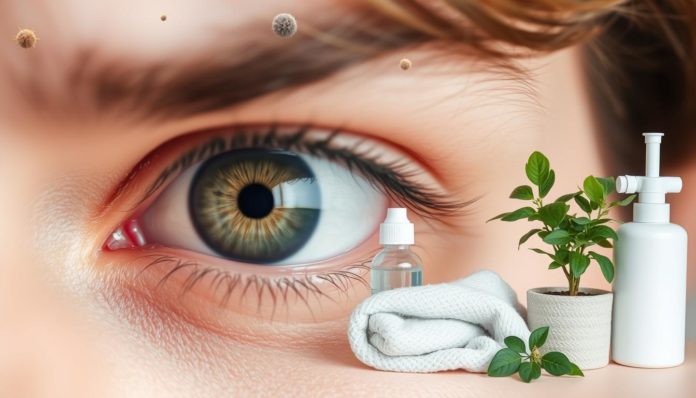Did you know over 50 million Americans deal with allergies each year, leading to itchy eyes? This discomfort isn’t just seasonal but also stems from sources like infections, dry eye syndrome, and contacts. In this article, we’ll look at common causes of itchy eyes. Plus, we give tips for relieving eye irritation and discomfort.
With spring, there’s often a rise in itchy eyes. But infections and other eye conditions play a role too. Understanding these triggers helps in finding effective solutions. Though usually not severe, itchy eyes can be very annoying, whether due to pollen or long hours in front of screens.
To lessen this irritation, we need to know the different factors that might cause it. From environmental allergens to how you care for your lenses, we will provide detailed guidance. We aim to help you keep your eyes feeling great.
Common Causes of Itchy Eyes
Having itchy eyes can be quite annoying. Knowing what causes it can help find the right treatment. Let’s look at some common reasons for this irritation.
Allergies
Allergies are a top reason for itchy eyes. Things like pollen, pet fur, mold, and dust mites can lead to allergic conjunctivitis. This condition makes eyes red, irritated, and burn.

Infection
Infections like pinkeye, or medically, conjunctivitis, often cause itchy eyes. These can be from bacteria or viruses. They make eyes red, swollen, and sometimes, leaky.
Blepharitis
Eyelid inflammation, known as blepharitis, is another cause. It comes from blocked oil glands near the eyelashes. This issue is usually not contagious.
Dry Eye Syndrome
Dry eye syndrome happens with not enough tears or poor-quality tears. This leads to constant dryness and itch. Screen time and the environment can make it worse.
Foreign Substance
Things like dust, sand, or tiny bugs can irritate eyes. They cause instant itching. It’s important to quickly get these out.
Contact Lenses
Badly fitting lenses or not keeping them clean can cause irritation. This makes eyes itchy. Taking good care of lenses and making sure they fit is key.
Corneal Ulcers
Severe itching might be from corneal ulcers. These are open sores on the cornea from dryness, injury, or infection. They need a doctor’s care.
Symptoms to Watch For
Symptoms of ocular pruritis include more than itching. People often see red eyes too. You might also notice itchy eyelids, which distract from daily tasks. Another sign is a clear or yellow discharge. This could mean an infection or allergy.
Other symptoms often join the list. A runny nose usually points to allergies. Likewise, much sneezing suggests you’re responding to allergens. These signs help figure out the cause of eye discomfort.
Knowing these symptoms helps in finding relief and treatment. If these signs are familiar, think about what’s causing them. It’s wise to get advice from a professional for proper care.

Diagnosing Itchy Eyes
Diagnosing eye conditions starts with a detailed exam. Various steps make sure the evaluation and treatment are correct. Let’s explore these important steps:
Medical History
First, doctors collect your medical history. They ask about previous eye problems, family eye disease history, and current symptoms. This helps find possible causes and issues.
Physical Examination
Next, your eyes are closely checked. Doctors look at the eyelids, conjunctiva, and cornea. They also test vision and eye movement. This gives a full picture of your eye health.
Laboratory Tests
Sometimes, more tests are needed. Eye samples might be taken to find infections or other issues. These tests help make a very accurate diagnosis. So, the treatment will directly target what’s wrong.
By reviewing medical history, doing physical exams, and running tests, doctors can fully assess your eyes. This careful approach is key to finding the cause of itchy eyes. It helps doctors create the best plan for your relief and healing.
Itchy Eyes Causes and Treatments
Finding the reason behind itchy eyes is key. It could be allergies, infections, or things like dust. Using ocular health remedies and eye health treatments helps make things better.
If allergies are bothering you, getting rid of them might involve antihistamines. It’s also good to stay away from what triggers your allergies. Drinking more water and keeping your surroundings clean helps too.
An infection might need antibiotics or antiviral meds to clear up. It’s all about managing these eye conditions the right way.
For things like dry eyes, artificial tears can help. If something gets in your eye, a saline solution can wash it out. Always keep your eyes clean, especially if you wear contacts.
Dealing with itchy eyes means looking at the big picture. Once you know what’s wrong, you can find the best eye health treatments. A mix of changes in your life and doctor’s advice works best for itchy eyes.
Home Remedies for Itchy Eyes
If your eyes are itching, you can try some effective home remedies. These natural solutions can give you relief right at home.
Cold Compress
A cold compress can lessen the redness and swelling from eye irritation. Just soak a clean cloth in cold water. Press it gently against your closed eyes for relief.
Artificial Tears
Artificial tears keep your eyes moist and remove irritants. These eye drops are easy to find and can soothe itchy eyes quickly.
Saline Solution
A saline solution rinse can get rid of irritating substances in your eyes. It’s gentle yet effective for itchy eyes, especially if they bother you often.
Proper Contact Lens Hygiene
Contact lens wearers need to take care of their lenses to avoid eye problems. Clean and store your lenses as the maker suggests. This will help avoid infections and keep your eyes feeling good.
Want more tips for dealing with itchy eyes? Check out this helpful resource. If your eyes stay itchy or get worse, talk to an eye specialist.
Medications for Itchy Eyes
Sometimes, home treatments aren’t enough for itchy eyes. You might need medicine. Many types are available to help and get to the problem’s cause.
Antihistamine eye drops are a good choice. They’re great for allergy symptoms. They block histamines that cause allergies.
Anti-inflammatory eye treatments help reduce swelling and ease pain. For really bad inflammation, steroid eye drops are an option.
If you have a bacterial infection, you might need antibiotic eye drops. For tough cases, doctors sometimes suggest stronger methods. This could even mean small surgeries.
| Medication Type | Purpose |
|---|---|
| Antihistamine Eye Drops | Block histamines to relieve allergies |
| Anti-inflammatory Eye Treatments | Reduce inflammation and pain |
| Antibiotic Eye Drops | Combat bacterial infections |
| Steroid Eye Drops | Control severe inflammation |
Always talk to a healthcare professional before choosing a treatment. People react differently to medications. A professional can guide you on the safest way to manage your symptoms.
Prevention Tips to Avoid Itchy Eyes
Preventing itchy eyes is often better than treating them. Adding a few key habits to your routine can help a lot. These habits can greatly cut down on eye irritation.
Avoiding Allergens
Staying away from allergens is vital for keeping allergies at bay. Things like pollen, pet fur, and dust are common triggers. Wear sunglasses to protect your eyes outside. Inside, use dehumidifiers to keep the air clean. This helps reduce allergens.
Maintaining Cleanliness
Keeping your home clean is key to fighting itchy eyes. Make sure to shower often to get rid of allergens on you. Change your bedding regularly to fight dust mites. Use cold compresses or eye drops if your eyes are mildly irritated.
Proper Lid Hygiene
Taking care of your eyelids is important too. Always wash your hands and don’t touch your eyes. Make sure all makeup is off before you go to sleep. Makeup residue can make irritation worse. For those who wear contacts, clean them well to prevent eye problems.
When to See a Doctor
If your itchy eyes don’t get better with over-the-counter treatments or home fixes, it’s time to see a doctor. This is especially true if your symptoms get worse. Eye problems needing quick medical help include lots of discomfort, ongoing red eyes, strange discharge, or changes in how well you can see. Seeing an eye doctor can give you advice just for you, helping you feel better and take proper care of your eyes.
Sometimes, itchy eyes show a bigger problem that needs checking by a doctor. This could be serious allergies, infections, or hidden eye diseases. Going to an eye doctor helps treat not just the itchiness but also stops more issues from happening. Getting help early can effectively deal with the root causes and keep your eyes healthy.
Don’t overlook it if the itchiness or irritation keeps up or gets worse. Going for an eye check-up means you’ll get a full review and advice on how to treat your itchy eyes. The right treatment, whether it be changing your medication, getting special care, or following new health advice, can make a big difference in your eye health and life quality.
FAQ
What are the common causes of itchy eyes?
Itchy eyes come from many sources including allergies. Pollen, pet dander, and mold are common triggers. Eye infections like pinkeye, eyelid inflammation known as blepharitis, and dry eyes also cause itchiness. Foreign objects, poorly fitted contact lenses, and serious issues such as corneal ulcers are other causes.
What symptoms should I watch for if I have itchy eyes?
Watch out for more than itchiness. Clear or yellow gunk, red eyes, and a burning feeling are signs. Sneezing or a runny nose could mean you’re dealing with allergies.
How are itchy eyes diagnosed?
Doctors start with your medical history to diagnose itchy eyes. A physical eye exam and sometimes lab tests for bacteria follow.
What are some home remedies for itchy eyes?
Try a cold pack or artificial tears for quick relief. Rinsing your eyes with saline solution helps. Also, keep your contact lenses clean.
What types of medications are available for treating itchy eyes?
For itchy eyes, you have options. Antihistamine eye drops, anti-inflammatory treatments, and allergy pills help. There are also antibiotic drops. For tough cases, steroid drops or surgery might be needed.
How can I prevent itchy eyes?
Avoid allergens and keep things clean for starters. Practice good eyelid and hand hygiene. Don’t rub your eyes. Take off makeup before bed.
When should I see a doctor for itchy eyes?
If home cures and precautions don’t work, see a doctor. Especially if you have bad discomfort, eye gunk, or changes in vision. A doctor can prevent bigger problems.


